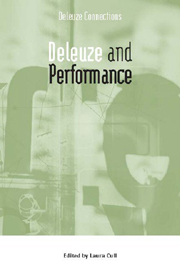Book contents
- Frontmatter
- Contents
- Introduction
- 1 Performing in the Chaosmos: Farts, Follicles, Mathematics and Delirium in Deleuze
- Act I Deleuze on Theatre: Artaud, Beckett and Carmelo Bene
- Interval
- Act II Confronting Deleuze and Live Performance
- 6 Becoming a Citizen of the World: Deleuze Between Allan Kaprow and Adrian Piper
- 7 sub specie durationis
- 8 Thinking Through Theatre
- 9 Becoming–Dinosaur: Collective Process and Movement Aesthetics
- Interval
- Act III A Digital Deleuze: Performance and New Media
- Notes on Contributors
- Index
9 - Becoming–Dinosaur: Collective Process and Movement Aesthetics
from Act II Confronting Deleuze and Live Performance
Published online by Cambridge University Press: 12 September 2012
- Frontmatter
- Contents
- Introduction
- 1 Performing in the Chaosmos: Farts, Follicles, Mathematics and Delirium in Deleuze
- Act I Deleuze on Theatre: Artaud, Beckett and Carmelo Bene
- Interval
- Act II Confronting Deleuze and Live Performance
- 6 Becoming a Citizen of the World: Deleuze Between Allan Kaprow and Adrian Piper
- 7 sub specie durationis
- 8 Thinking Through Theatre
- 9 Becoming–Dinosaur: Collective Process and Movement Aesthetics
- Interval
- Act III A Digital Deleuze: Performance and New Media
- Notes on Contributors
- Index
Summary
This chapter puts forward two arguments. First, I contend that bodies with intellectual disability are constructed through specific systems of knowledge; namely, schemes of thought that are grounded in medical models. These medically based knowledges generate particular systems of affect – where affect is understood as taking something on, as changing in relation to an experience or encounter. Deleuze employs this term in differing ways, but for the purposes of this chapter I am primarily interested in the notion of ‘affectus’, understood as a kind of movement or subjective modulation. In Spinoza: Practical Philosophy Deleuze describes ‘affectus’ as ‘an increase or decrease of the power of acting, for the body and the mind alike’ (Deleuze 1988: 49).1 So, to be affected is to be able think or act differently; although, as responses, affects can easily become habitual. Familiar responses are learnt in relation to bodies and subjects and it is only by challenging the ‘truth’ that is acknowledged in the known response or habitual behaviour that we can learn a new way of responding and of being affected.
Second, I argue that performance spaces can offer radically new ways of being affected by people with disabilities. It is my contention that people who are known as ‘intellectually disabled’ are primarily understood in relation to systems of affect, or kinaesthetic economies of relation, established through medical discourses. As I have argued elsewhere (Hickey-Moody 2006), kinaesthetic economies of relation established via medical discourses of intellectual disability are based upon understandings of bodily limits, rather than bodily capacities.
- Type
- Chapter
- Information
- Deleuze and Performance , pp. 161 - 180Publisher: Edinburgh University PressPrint publication year: 2009



